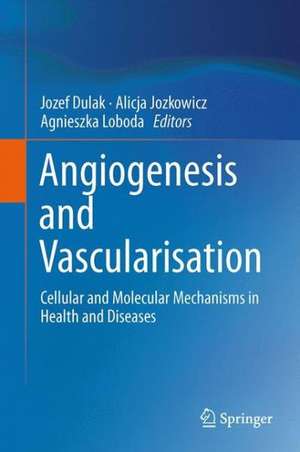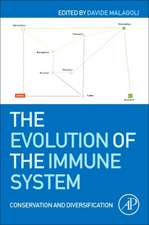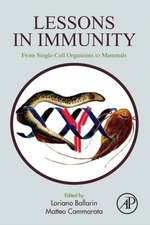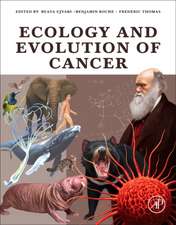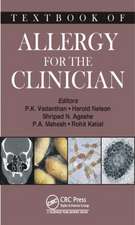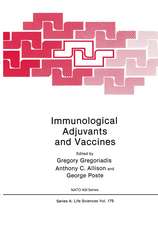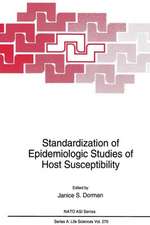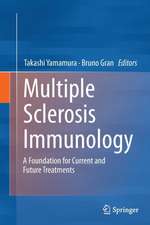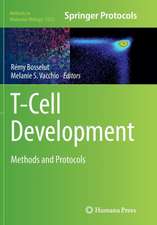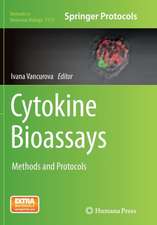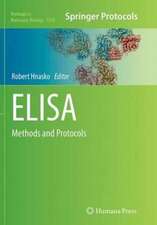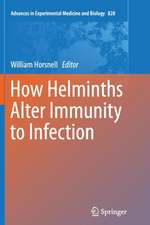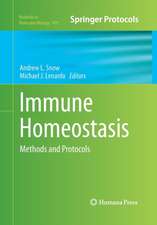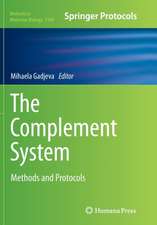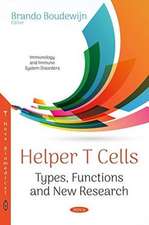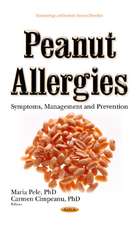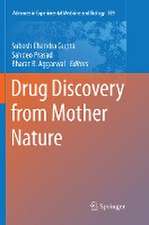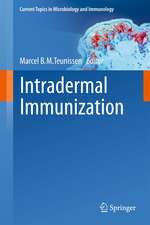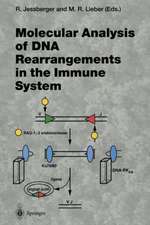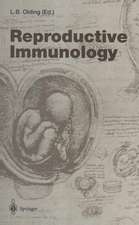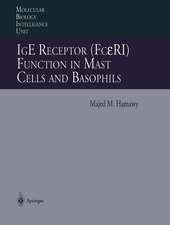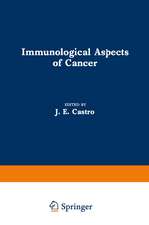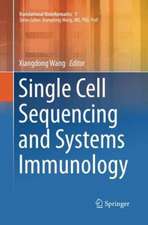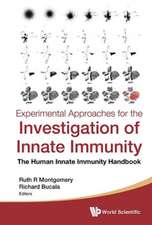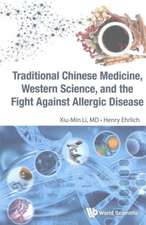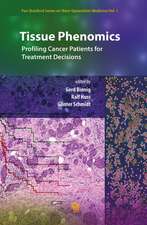Angiogenesis and Vascularisation: Cellular and Molecular Mechanisms in Health and Diseases
Editat de Józef Dulak, Alicja Józkowicz, Agnieszka Łobodaen Limba Engleză Hardback – 18 feb 2014
| Toate formatele și edițiile | Preț | Express |
|---|---|---|
| Paperback (1) | 1101.37 lei 6-8 săpt. | |
| SPRINGER VIENNA – 22 aug 2016 | 1101.37 lei 6-8 săpt. | |
| Hardback (1) | 1115.86 lei 6-8 săpt. | |
| SPRINGER VIENNA – 18 feb 2014 | 1115.86 lei 6-8 săpt. |
Preț: 1115.86 lei
Preț vechi: 1174.58 lei
-5% Nou
Puncte Express: 1674
Preț estimativ în valută:
213.57€ • 222.13$ • 178.98£
213.57€ • 222.13$ • 178.98£
Carte tipărită la comandă
Livrare economică 13-27 martie
Preluare comenzi: 021 569.72.76
Specificații
ISBN-13: 9783709114278
ISBN-10: 3709114276
Pagini: 500
Ilustrații: X, 416 p. 60 illus., 45 illus. in color.
Dimensiuni: 155 x 235 x 22 mm
Greutate: 0.95 kg
Ediția:2014
Editura: SPRINGER VIENNA
Colecția Springer
Locul publicării:Vienna, Austria
ISBN-10: 3709114276
Pagini: 500
Ilustrații: X, 416 p. 60 illus., 45 illus. in color.
Dimensiuni: 155 x 235 x 22 mm
Greutate: 0.95 kg
Ediția:2014
Editura: SPRINGER VIENNA
Colecția Springer
Locul publicării:Vienna, Austria
Public țintă
ResearchCuprins
Cells and mediators: Endothelial cell origin, differentiation, heterogeneity and function.- Developmental and pathological lymphangiogenesis.- Vascular resident endothelial side population cells.- Multiple role of proteases in angiogenesis.- Serpins in angiogenesis.- Molecular mechanisms: Endothelial transcriptional networks in the control of angiogenesis: the ETS factor.- Insights into roles of immediate-early genes in angiogenesis.- Molecular mechanisms of hypoxia-regulated angiogenesis.- MicroRNA Regulation of Angiogenesis.- Nrf2 transcription factor and heme oxygenase-1 as modulators of vascular injury and angiogenesis.- Metabolism of methylarginines and angiogenesis.- The Vasohibin Family: Novel Regulators of Angiogenesis.- Diseases and Therapy: Hypoxia-induced pathological angiogenesis in zebrafish.- Tumor angiogenesis: Fishing for screening models.- Vascular complications in diabetes.- Angiogenesis in rheumatoid arthritis.- Angiogenic signaling and structural abnormalities in tumors.- Endothelium in pathologic angiogenesis and angiogenesis-mediated therapies.
Notă biografică
Professor Jozef Dulak completed his doctoral studies at the Laboratory of Evolutionary Immunology at the Faculty of Biology, Jagiellonian University in Krakow, Poland, in 1990. He spent his post-doctoral trainings at Free University of Amsterdam, The Netherlands (1990/1991), University of Muenster, Germany (1994), and Stanford University, USA (1996/1997). He was appointed Assistant Professor at the Faculty of Biology of Jagiellonian University in Krakow from 1990 to 1993, at then at the Department of Clinical Biochemistry from 1993-1999. From 1999 to 2001 he was a research fellow at the Department of Cardiology, Innsbruck University, Austria. He became Associate Professor at the Department of Cell Biochemistry of Jagiellonian University in 2001. Since 2005 he has been the Head of the Department of Medical Biotechnology and since October 2007 he has been full Professor of the Department of Medical Biotechnology, Faculty of Biochemistry, Biophysics and Biotechnology, Jagiellonian University, Krakow, Poland. Since 2011 he is a member of the Polish Academy of Arts and Sciences. In 2012 he became doctor honoris causa of University of Orleans, France. His research interests focus on mechanism of angiogenesis and vascularisation, the role of oxidative stress, gasotransmitters and non-coding RNA in stem cells differentiation, application of gene and cell therapy in modulating neovascularisation and inflammation, and the role of hypoxia in blood vessel formation. Professor Alicja Jozkowicz obtained her PhD degree in 1997 at the Laboratory of Evolutionary Immunology, Faculty of Biology, Jagiellonian University in Krakow, Poland. She worked at the Department of Clinical Biochemistry (1996-2000) and was a post-doctoral research fellow at the Department of Cell Biology, Baylor College of Medicine in Houston, USA (1997-1998), and at the Department of Vascular Surgery, Medical University in Vienna, Austria (2000-2002). In 2002 she joined as Assistant Professor the Faculty of Biochemistry Biophysics and Biotechnology, Jagiellonian University in Krakow. In 2005 she became Associate Professor at the Department of Medical Biotechnology, and then a full Professor in 2010. She is the president of the Polish Society of Cell Biology since 2009. Her research interests include the role of oxidative stress and inflammatory reaction in regulation of endothelial cell function, effects of antioxidative genes on tumor neovascularization, and involvement of microRNA in these processes.
Textul de pe ultima copertă
The book presents the overview of the current knowledge in some fields of vascular biology, addressing cellular and molecular aspects of blood-vessel formation and their role in health and disease. The major factors involved in the formation of blood vessels are presented by scientists actively involved in this area of research. Special emphasis is put on the presentation of various molecular mechanisms not addressed in similar works to date. The book is divided into three parts. The first part describes the cells and mediators in angiogenesis. The significance of various populations of potential endothelial progenitors is particularly highlighted. The chapters of the second part focus on molecular mechanisms, with special emphasis on the role of hypoxia, gasotransmitters and reactive oxygen species as well as microRNAs in regulation of angiogenic processes. In the third part, the pathological aspects of disturbed – aggravated or impaired – vascularization are discussed and new modalities for potential therapies are presented.
The book is intended for scientists and PhD students in the fields of vascular biology and cancer research. It may be of interest for medical professionals in the fields of cardiovascular disease, diabetes, oncology and rheumatoid arthritis.
The book is intended for scientists and PhD students in the fields of vascular biology and cancer research. It may be of interest for medical professionals in the fields of cardiovascular disease, diabetes, oncology and rheumatoid arthritis.
Caracteristici
Presents current state of the art
Comprehensive work, describing physiological and pathophysiological mechanisms of vascularisation and angiogenesis
Special emphasis is put on reactive oxygen species and role of microRNAs
Includes supplementary material: sn.pub/extras
Comprehensive work, describing physiological and pathophysiological mechanisms of vascularisation and angiogenesis
Special emphasis is put on reactive oxygen species and role of microRNAs
Includes supplementary material: sn.pub/extras
